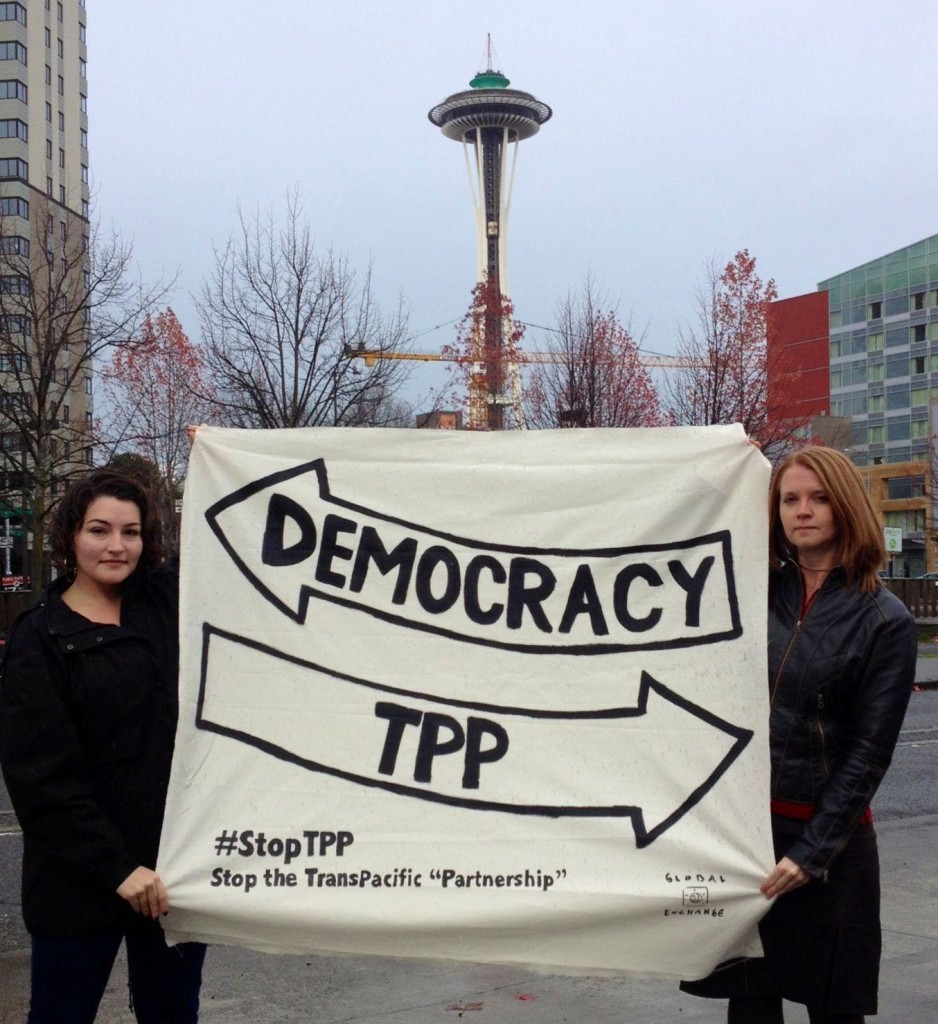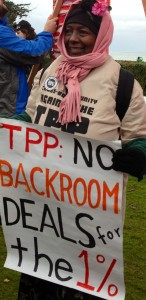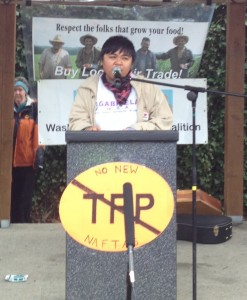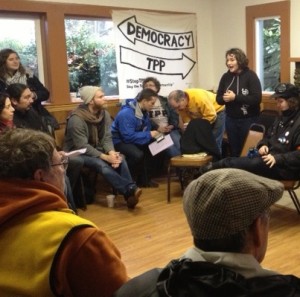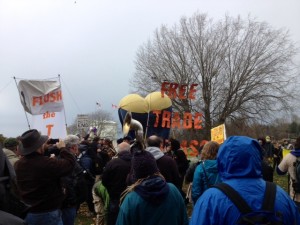The following piece was originally posted by the Citizens Trade Coalition. Please stand with the growing coalition of organizations and people on 4 continents and say: #StopTPP!
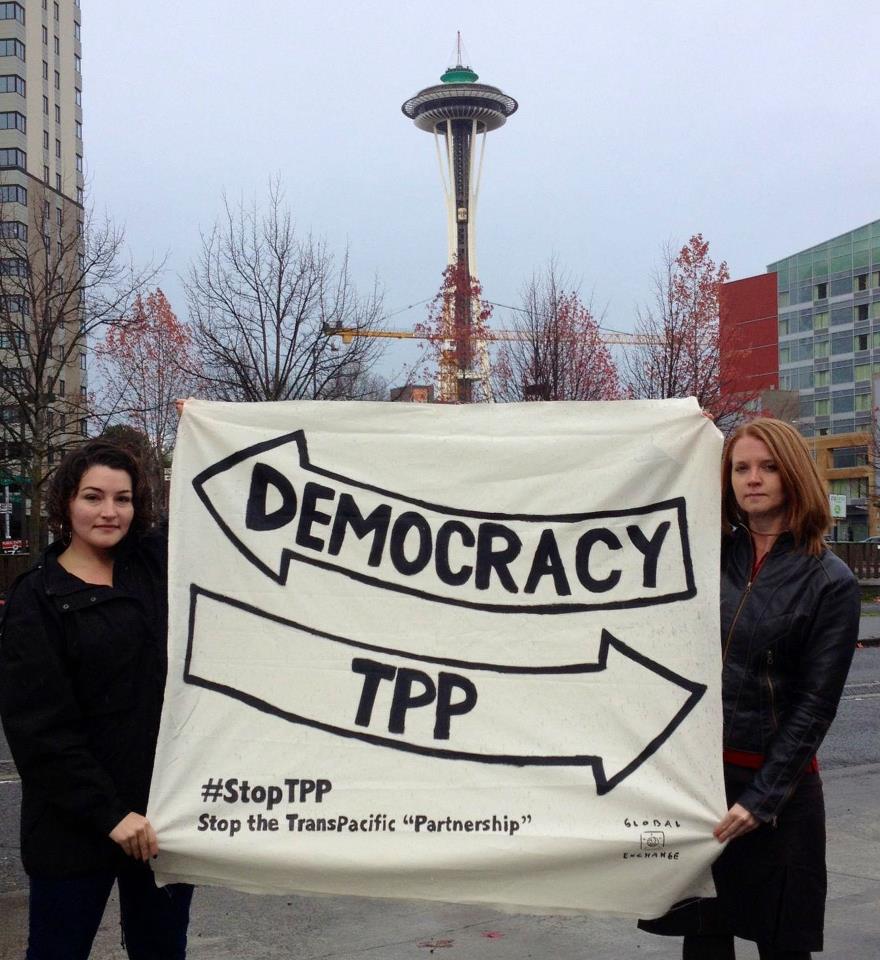 Timed with the start of the next Trans-Pacific Partnership (TPP) negotiating round in Peru this May, communities throughout the Pacific Rim will be holding public assemblies to discuss the potential local impacts of the TPP and steps people can take together to prevent being saddled with a disastrous corporate trade deal.
Timed with the start of the next Trans-Pacific Partnership (TPP) negotiating round in Peru this May, communities throughout the Pacific Rim will be holding public assemblies to discuss the potential local impacts of the TPP and steps people can take together to prevent being saddled with a disastrous corporate trade deal.
Whether one wants to reverse the global race to the bottom in wages and working conditions; expand access to life-saving generic medications; support indigenous rights; protect communities’ ability to combat global warming; or sustain family farms and defend food sovereignty, there is no shortage of reasons to act together on the TPP.
One of the first steps is self-education, community dialogue and local organizing. Please attend one of the events already in the works in your community or help organize one yourself. Learn more (about) the Days of Action below and at this international website.
How to Organize a Community Assembly about the TPP:
Corporate media isn’t giving the TPP the attention it deserves, so it is up to us to spread the word. Organizing your own teach-in, town hall or community forum about the TPP is a great way to educate and mobilize your community about it.
• Find a venue. Union halls, churches, community centers and libraries are all great, free or low-cost venues. Choose a venue that is convenient and familiar to the audience you’re seeking to reach.
• Recruit speakers. You know your audience and what messengers will move them. Local labor, environmental and human rights organizations may be able to provide speakers — especially on the local impacts of past trade agreements such as NAFTA and the WTO — which you can supplement by speaking yourself about the TPP using the talking points found here. You can also reach out to the points of contact listed in this toolkit for additional speaker suggestions.
• Get cosponsors. Ask trusted local organizations if you can list them as event cosponsors and if they will spread the word about your event to their membership.
• Spend most of your time on turnout. At minimum, create an email about the event that you circulate to as many people as you can — asking them to forward it to their lists. Other turnout strategies include: creating a Facebook event page for the event; leafleting other events; posting flyers at the venue and elsewhere; phonebanking your friends and other phone lists; and putting an event listing in newspapers and newsletters. Please also email tppaction@citizenstrade.org and we may be able to help promote it.
• Invite Members of Congress. Consider inviting Members of Congress and their staff to attend your event. If they show up, they will learn something — and even if they don’t, they’ll at least know that constituents are talking about the TPP.
• Circulate a sign-in sheet. Have a sign-in sheet for the event, and have a volunteer hit up everyone as they enter and/or circulate it on a clipboard as people are seated. These are people who care about the TPP and you may want to communicate with them in the future. Be sure to get their names, email addresses and phone numbers.
• Include an action step. Pass out copies of this fact sheet at the event, and have people call their U.S. Representative on their cell phone before they leave with a message urging the Congress member to oppose Fast Track for the TPP. You can also circulate a poster-sized petition that you have people sign and then recruit volunteers to help deliver it to your local Congressional office; ask people (to) raise their hands if they can help bird-dog at an upcoming Congressional town hall; or break into small groups to plan other types of action.
• Spread the word about what you learn. Recruit someone to videotape your presenters and post the videos online. You can share the videos with people who signed up on the sign-up sheet and encourage them to share them with friends who couldn’t attend and to post them on social media. Also consider writing and circulating a press release about the event with short quotes about the TPP from each of your speakers. You can send it out to both the corporate media and over listserves to help spread the word.
Materials for the Days of Action
A Sampling of TPP Events & Contacts
The main “Day of Action” is Saturday, May 11 — but you can organize an event any time. Email us at tppaction@citizenstrade.org if you want help promoting your local event.
.
California
The TPP & Obama’s Asian Pivot
May 31 – June 2
San Francisco, CA
Contact: Victor Menotti, vmenotti@ifg.org
.
District of Columbia
TPP Briefing & Strategy Discussion
Saturday, May 11 * Details TBA
Contact: Lacey Kohlmoos, lkohlmoos@citizen.org
.
Illinois
TPP Teach-in (@ World Fair Trade Day Festival)
Tuesday, May 7 * 3:00pm
Daley Plaza, 50 W Washington
Chicago, IL
Contact: Josh Wise, josh@citizenstrade.org
.
Minnesota
TPP Teach-in & World Fair Trade Day Celebration
Saturday, May 11 * 12:00 – 4:00pm
Regla De Oro Gallery, 2743 Lyndale Ave S
Minneapolis, MN
Contact: Josh Wise, josh@citizentrade.org
.
Oregon
PDX People’s Assembly on the TPP
Saturday, May 11 * 1:00pm
First Unitarian Church, SW 12th Ave & Main St
Portland, OR
Contact: Elizabeth Swager, elizabeth@oregonfairtrade.org
.
Eugene/Springfield People’s Assembly on the TPP
Monday, April 29 * 6:00pm
AFSCME Bldg, 688 Charnelton St
Eugene, OR
Contact: Elizabeth Swager, elizabeth@oregonfairtrade.org
.
Jackson County People’s Assembly on the TPP
Sunday, April 28 * 4:30pm
At the Grass Shack Cafe, 205 Fern Valley Rd
Phoenix, OR (Exit 24 off I-5)
Contact: Elizabeth Swager, elizabeth@oregonfairtrade.org
.
Pennsylvania
Dawson TPP Workshop
Thursday, May 16 * Details TBA
Contact: Amy Conahan, amy@citizenstrade.org
.
Texas
San Antonio TPP Event
Details TBA
Contact: Bob Cash, bobcash@citizenstrade.org
.
Washington
TPP People’s Assembly Seattle
Saturday, May 11 * 2:00 – 5:00pm
Central Co-op, 1900 E Madison
Seattle, WA
Contact: Kristen Beifus, kristen@washingtonfairtrade.org
.
TPP People’s Assembly Olympia
Date & Time TBA
906 Columbia Street SW
Olympia, WA
Contact: Kristen Beifus, kristen@washingtonfairtrade.org
.
For events in Canada and beyond, please click here.
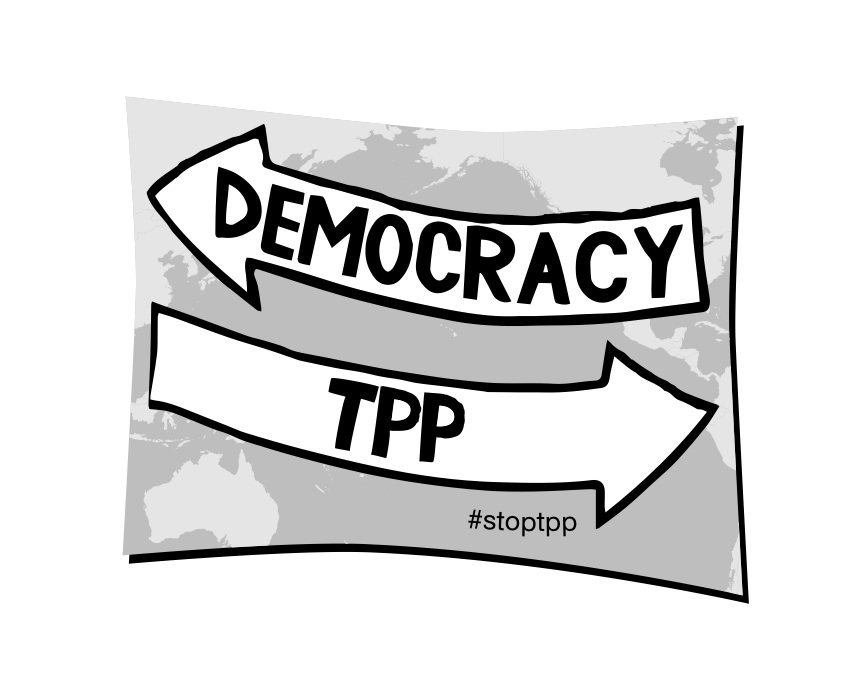
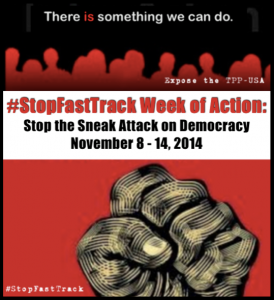 Immediately after the U.S. midterm elections, questions were raised about plans to introduce Fast Track legislation during the lame duck session of Congress and President Obama flew to Asia for a week of meetings, some dealing with finalizing the Trans-Pacific Partnership (TPP). But while new Congressional maps were analyzed, fair trade activists wasted no time – and got to work during the Week of Action Against Fast Track and the TPP.
Immediately after the U.S. midterm elections, questions were raised about plans to introduce Fast Track legislation during the lame duck session of Congress and President Obama flew to Asia for a week of meetings, some dealing with finalizing the Trans-Pacific Partnership (TPP). But while new Congressional maps were analyzed, fair trade activists wasted no time – and got to work during the Week of Action Against Fast Track and the TPP.

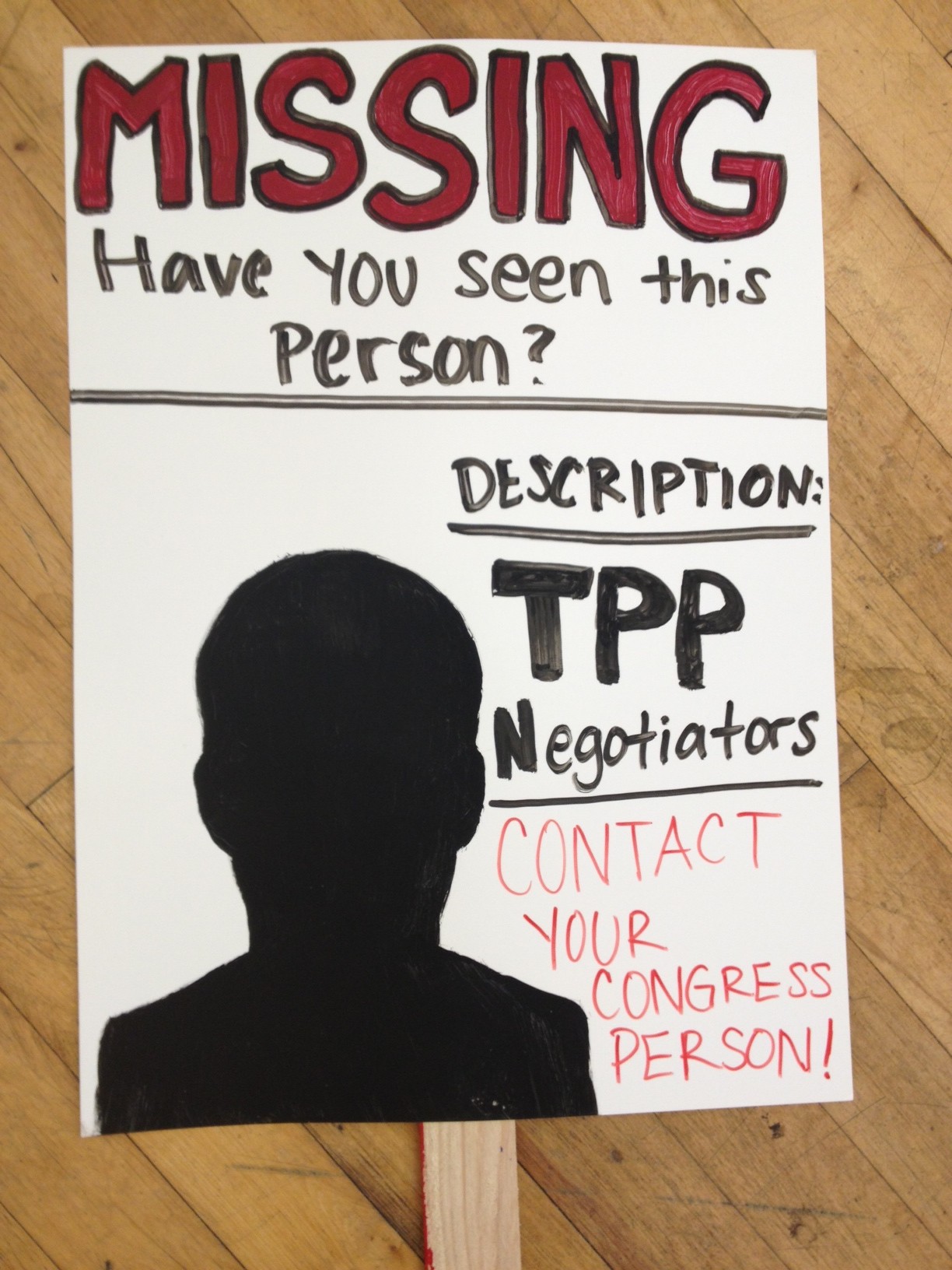 News broke late last week in a few
News broke late last week in a few 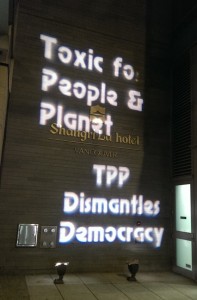
 TAKE ACTION!
TAKE ACTION!
 Timed with the start of the next Trans-Pacific Partnership (TPP) negotiating round in Peru this May, communities throughout the Pacific Rim will be holding public assemblies to discuss the potential local impacts of the TPP and steps people can take together to prevent being saddled with a disastrous corporate trade deal.
Timed with the start of the next Trans-Pacific Partnership (TPP) negotiating round in Peru this May, communities throughout the Pacific Rim will be holding public assemblies to discuss the potential local impacts of the TPP and steps people can take together to prevent being saddled with a disastrous corporate trade deal.
